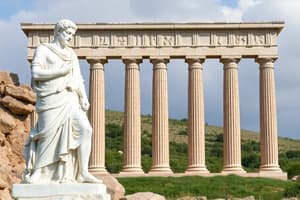Podcast
Questions and Answers
What is the primary power described that rules within us?
What is the primary power described that rules within us?
- An inner power that adapts to situations. (correct)
- The force of public opinion.
- The power of external circumstances.
- The ability to create material wealth.
What is the nature of actions taken at random?
What is the nature of actions taken at random?
- They signify a lack of focus.
- They should align with established principles. (correct)
- They lead to unexpected results.
- They are generally more effective.
What is described as the best retreat for a person seeking peace?
What is described as the best retreat for a person seeking peace?
- A bustling city full of activity.
- The solitude within one's own soul. (correct)
- A remote holiday destination.
- A quiet place in nature.
What does the text imply about the relationship between people and their faults?
What does the text imply about the relationship between people and their faults?
How should one view the concerns of the body in relation to the mind?
How should one view the concerns of the body in relation to the mind?
What does the text suggest about the fleeting nature of fame?
What does the text suggest about the fleeting nature of fame?
What should be the focus when faced with the wickedness of mankind?
What should be the focus when faced with the wickedness of mankind?
What is the ultimate perspective on existence described in the text?
What is the ultimate perspective on existence described in the text?
What does the text suggest about external events and their effect on the soul?
What does the text suggest about external events and their effect on the soul?
Which statement best reflects the author’s view on praise from others?
Which statement best reflects the author’s view on praise from others?
How does the text describe the relationship between mankind and the Universe?
How does the text describe the relationship between mankind and the Universe?
What is the nature of death?
What is the nature of death?
What does the author imply about human actions and their outcomes?
What does the author imply about human actions and their outcomes?
What is meant by 'the world is a succession of changes' in the text?
What is meant by 'the world is a succession of changes' in the text?
What does the text imply about holding onto freedom?
What does the text imply about holding onto freedom?
Which idea is reflected in the statement about neither distraught nor overstrained?
Which idea is reflected in the statement about neither distraught nor overstrained?
Flashcards
Inner power
Inner power
The inherent ability within us to adapt to any situation easily if aligned with nature.
Principled action
Principled action
Actions should be taken in complete accordance with underlying principles.
Mental retreat
Mental retreat
Finding inner peace and quiet through introspection.
Perfect order (soul)
Perfect order (soul)
Signup and view all the flashcards
Human nature
Human nature
Signup and view all the flashcards
Compassion for others
Compassion for others
Signup and view all the flashcards
World's influence
World's influence
Signup and view all the flashcards
Acceptance of fate
Acceptance of fate
Signup and view all the flashcards
Inner Peace
Inner Peace
Signup and view all the flashcards
External Influence
External Influence
Signup and view all the flashcards
Common Law
Common Law
Signup and view all the flashcards
The Universe as a State
The Universe as a State
Signup and view all the flashcards
Intellectual Power's Source
Intellectual Power's Source
Signup and view all the flashcards
Death as a Natural Process
Death as a Natural Process
Signup and view all the flashcards
Fate and Acceptance
Fate and Acceptance
Signup and view all the flashcards
The Fleeting Nature of Life
The Fleeting Nature of Life
Signup and view all the flashcards
Study Notes
Stoic Philosophy: Key Concepts
-
Inner Power: Power within us adapts to any situation. It doesn't need specific resources, only the will to act. Like a large fire, which consumes the fuel added, problems are transformed into opportunities for growth.
-
Principled Action: Avoid random actions; act in accordance with fundamental principles.
-
Inner Retreat: Find peace within yourself, not in external locations. Perfect order of soul is rest. Use moments of contemplation to quiet the world's distractions.
-
Compassion and Understanding: Recognize that humans are created for each other, needing patience with others, and that errors are a part of being human. Reflect on the transience of life and the inevitable end of all things.
-
Mind over Matter: External issues don't directly affect the soul. Concerns about pain, loss, or the opinions of others are reactions to perceived external threats, but have little impact when the mind is disciplined and self-aware.
-
The Transience of Fame: Fame is fleeting. Reflect on how small and temporary human recognition is in the vastness of time.
-
Freedom and Courage: Maintain personal freedom, consider all matters with strength, courage, and mindful consideration of their place within society. Live as a human being, and understand your responsibility as a citizen of the world.
-
External vs. Internal: External events don't change the soul directly. Suffering is caused by our perception of these events.
-
Universal State: The universe functions as a state. Humans are all members of this state, sharing a common law and reason. The common state provides principles of thought, reason, and law. The mind has a divine origin.
-
Death as Natural: Death is a natural part of life, without shame or moral wrongdoing, with both the beginning and end reflecting the cyclical nature of the elements.
-
Fate and Individual Responsibility: Actions result from specific causes (fate). Trying to alter this is futile. Recognize that both you and others are mortal, and our influence over time is limited
Studying That Suits You
Use AI to generate personalized quizzes and flashcards to suit your learning preferences.




